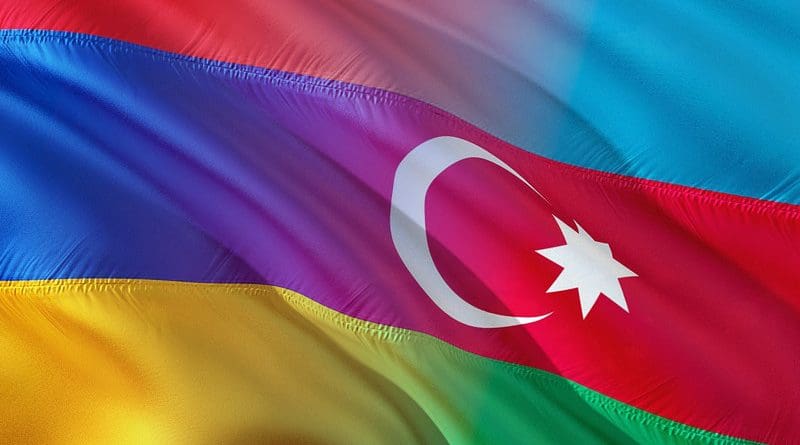Opportunities Abound If Armenia, Azerbaijan Can Reconcile – OpEd
By Arab News
By Yasar Yakis*
The Azerbaijani army last week took measures to control new heights on the border with Armenia along a recently built road. This was in line with the terms of the tripartite ceasefire agreement of Nov. 9, 2020. This agreement determined that a new road had to be built to connect Armenia to Nagorno-Karabakh, avoiding the Lachin corridor, because the existing corridor crossed the province of Lachin that had to be returned to Azerbaijan.
The Azerbaijani government announced last August that a new road circumventing the city of Lachin was under construction. In turn, Yerevan said the subsidiary connections of this road to the border would be ready by April 1. Therefore, Azerbaijan on March 30 blocked the entrance to Armenia through the Lachin corridor as the new road was now available, allowing people to travel from Armenia to Nagorno-Karabakh. So, everything has unfolded according to previous agreements.
The Azeri authorities had warned on time both the Red Cross and the Armenian authorities that the Lachin corridor was soon to be closed. Minor confusion occurred when Armenian and Red Cross cars had to use the dirt roads. Extremists in Armenia and Nagorno-Karabakh — and particularly in the Armenian diaspora in France and the US — used this incident and tried to cause a storm in a teacup.
There are already two live conflicts between Azerbaijan and Armenia. One of them is on the exploration of mines in Nagorno-Karabakh without the permission of the Azeri authorities. Strained relations are continuing in and around this corridor, each side blaming the other.
The second is the opening of the Zangezur corridor that links the Nakhchivan exclave with Azerbaijan proper. This was a sort of quid pro quo in exchange for the opening of the Lachin corridor. According to Article 9 of the ceasefire agreement, “all economic and transport connections in the region were due to be unblocked and the government of Armenia was expected to guarantee the security of transport between the western regions of the Republic of Azerbaijan and the Nakhchivan Autonomous Region in order to arrange unobstructed movement of persons, vehicles and cargo in both directions.” Furthermore, the construction of new transport connections to link Nakhchivan to Azerbaijan proper was also agreed.
Now, with the opening of the alternative road, we have to see how the relations will evolve between Azerbaijan and Armenia.
The EU will probably get involved following the recent controversy. It has already attempted to steal the mediation role from Russia and the competition between these two game-makers continues. Russia now has other priorities because of the Ukrainian war, but it does not want its pressure to slacken off. In turn, EU Council President Charles Michel hosted several meetings in Brussels and paid visits to the Caucasus with a view to trying to bridge the differences between Baku and Yerevan, but so far no tangible progress has been achieved. The French parliament, meanwhile, does not miss any opportunity to further spoil Azeri-Armenian relations.
Azerbaijani President Ilham Aliyev last week appointed Masim Mammadov as a special representative for the Lachin district, which also covers the Zangezur economic region.
During the 2020 military conflict, extensive physical damage was caused by the Nagorno-Karabakh Armenians to the environment in the Lachin corridor and many of them were illegally settled outside of the administrative limits of the region. Baku announced last year that it would evict the Armenians who had illegally moved into the houses owned by Azeris who had fled during the Armenian invasion of Lachin, as well as those in the villages of Zabukh and Sus. Azeris were forced to leave the region for the duration of the 30-year occupation. The Azeri government is now trying to prevent Armenians from returning to the houses they had illegally occupied for those three decades.
As a second step, it will ask Armenians to vacate the Azeri houses they are occupying illegally. Thirdly, the Azeri government wants to repair the houses that belonged to Azeris and were deliberately damaged when the Armenians had to flee as the advancing Azeri army approached.
Despite this dark background, now that there is a prospect of reconciliation, there is huge potential for cooperation between Baku and Yerevan. Azerbaijan is an oil-rich country of 10 million inhabitants. It is the biggest economy in the South Caucasus. All Azeri economic indicators are three to four times bigger than those of Armenia. Most Armenians are well-educated and skillful. At the end of the day, all Armenians of Nagorno-Karabakh are full-fledged citizens of Azerbaijan. If peace could be established in the region, both Azerbaijanis and Armenians would benefit from the opportunities of the prosperous Azeri economy.
If only the two peoples could overcome their centuries-old hatred.
- Yasar Yakis is a former foreign minister of Turkiye and founding member of the ruling AK Party. Twitter: @yakis_yasar

